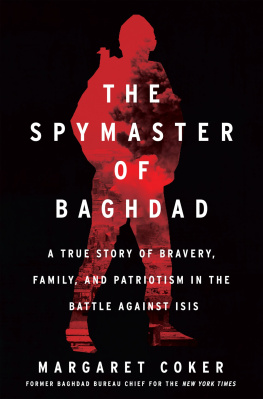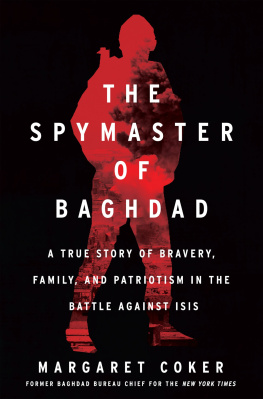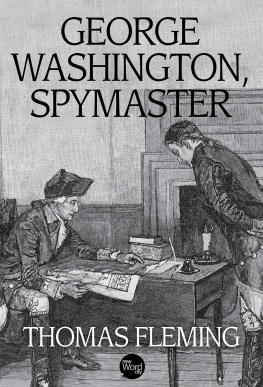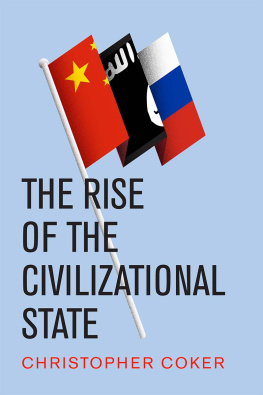Margaret Coker - The Spymaster of Baghdad
Here you can read online Margaret Coker - The Spymaster of Baghdad full text of the book (entire story) in english for free. Download pdf and epub, get meaning, cover and reviews about this ebook. year: 2020, genre: History. Description of the work, (preface) as well as reviews are available. Best literature library LitArk.com created for fans of good reading and offers a wide selection of genres:
Romance novel
Science fiction
Adventure
Detective
Science
History
Home and family
Prose
Art
Politics
Computer
Non-fiction
Religion
Business
Children
Humor
Choose a favorite category and find really read worthwhile books. Enjoy immersion in the world of imagination, feel the emotions of the characters or learn something new for yourself, make an fascinating discovery.
- Book:The Spymaster of Baghdad
- Author:
- Genre:
- Year:2020
- Rating:3 / 5
- Favourites:Add to favourites
- Your mark:
- 60
- 1
- 2
- 3
- 4
- 5
The Spymaster of Baghdad: summary, description and annotation
We offer to read an annotation, description, summary or preface (depends on what the author of the book "The Spymaster of Baghdad" wrote himself). If you haven't found the necessary information about the book — write in the comments, we will try to find it.
Margaret Coker: author's other books
Who wrote The Spymaster of Baghdad? Find out the surname, the name of the author of the book and a list of all author's works by series.
The Spymaster of Baghdad — read online for free the complete book (whole text) full work
Below is the text of the book, divided by pages. System saving the place of the last page read, allows you to conveniently read the book "The Spymaster of Baghdad" online for free, without having to search again every time where you left off. Put a bookmark, and you can go to the page where you finished reading at any time.
Font size:
Interval:
Bookmark:
To the Iraqis who work tenaciously and bravely to improve their
homeland. May your sacrifices not be in vain.
To the editors whose red pens and advice have made me a better writer.
To Craig, my huckleberry friend. As two drifters off to see the world,
youve been the best companion this gal ever hoped for.
F rom ancient Mesopotamia to modern times, military commanders and political leaders have praised the stealth, patience, and guile of spy craft when used in defense of their homelands and to achieve military victories.
During the recent wars fought in Iraq against Al Qaeda and the Islamic State, this conventional wisdom has never been more apt. In an era when national armies have the most technologically advanced weaponry in the world, killing terrorists is easy. Finding them is often the biggest challenge. Despite this, most of the books written about the disastrous U.S. invasion of the country in 2003 and its aftermath have been told through the lens of military officers, soldiers, and policy makers, and through their checkered attempts to stabilize the nation after the overthrow of Saddam Hussein, reform the Iraqi political system, and fight the militants who terrorized the nation and its fragile new government. These tales, often gripping and powerful accounts of how individual army and marine units fought, died, or survived their deployments, end in a common theme: how the political and security chaos created by the U.S. invasion fueled the radical Islamist propaganda espoused by Al Qaedas founder, Osama bin Laden, and the groups first leader in Iraq, Abu Musab al-Zarqawi, as well as his successors.
What most of these narratives leave out is the separate fight that raged in the shadows of the great military battles: the cloak-and-dagger work of spies to disrupt and dismantle the terror cells that were killing thousands of Iraqi civilians and American soldiers, and to capture the leaders who directed these evil acts. This omission is partially by design: many authors of books about the war on terror hail from military or policy backgrounds and understandably want to burnish their own reputations and histories. But this omission also has to do with the nature of the intelligence world itself, where the best, most effective counterintelligence work can only be accomplished out of the spotlight.
Few would describe Baghdad as glamorous as Casablanca was in the 1930s or Berlin during the Cold War, but since 2003, in the aftermath of the U.S. invasion, it became, like those two cities, a magnet for spies. Intelligence agents from around the world descended on the ancient city ravaged by decades of Saddams dictatorial misrule and security chaos, in part because of the rising international concern about the burgeoning Salafi jihadi menace posed by Al Qaeda, which by the mid-2000s had turned Iraq into its global terrorist headquarters.
Amid this intrigue, an unlikely man emerged among Iraqs new security agencies as a key player in identifying and infiltrating Al Qaedas networks.
Abu Ali al-Basri had spent most of his adult life on the run from Saddams secret police as part of the political opposition that had worked to bring down his dictatorial regime. Like most Iraqis, he had grown up reading the legends about his nations glorious past as the cradle of civilizations. Ancient Arabs loved a thrilling spy tale, such as the legend of Gilgamesh, in which the heroic king kills his enemies thanks to ingenuity and espionage. Even the tales of the Prophet Muhammad describe how he sent undercover agents behind enemy lines to keep him and his followers safe from rival tribes. Abu Ali loved these stories of bravery and derring-do, but he never aspired to be a spy. His career as an intelligence professional began as a path to survival. During his years in the Iraqi underground, he honed an expertise in surveillance, cover stories, and dead drops, and especially for cultivating agents who might be in a position to relay lifesaving information. When al-Basri returned from a long exile to work for Iraqs first democratically elected prime minister after 2003, he had skills that could help counter the nations newest national security threat.
Quietly, and controversially, al-Basri used his authority within the Iraqi government to stitch together an elite intelligence unit called al-Suquor, or the Falcons. He and his men worked independently from the newly reestablished security agencies that the Americans had refashioned for Iraq after 2003, institutions that cost billions of dollars in U.S. taxpayer funds but were failing in the fight against terrorism. The burgeoning spymaster worked, first, out of a makeshift office in a remote corner of the prime ministry complex in downtown Baghdad, and then, later, from a nondescript building along a pitted dirt road near Baghdads International Airport. From there he would launch missions to hunt the Sunni Islamist militants, and then work to turn those captured by the Falcons into high-level informants. The technique, unlike other Iraqi intelligence services who relied on brutality and torture, developed high-level, actionable intelligence, making him and his unit one of the U.S. militarys closest counterterrorism allies in the Middle East.
Not that anyone would know of the Iraqis reputation from the U.S. Armys official history of the Iraq Warwhich covers the counterterrorism struggles from 2003 until the American forces withdrew in 2011a time period during which the Al Qaeda threat exploded like a virulent plague across Iraq before being almost completely wiped out. The Falcons are absent from these annals, as they are from later newspaper reporting covering the period from 2011 to 2013, when Al Qaedas leaders regrouped under the helm of Abu Bakr al-Baghdadi into a new formidable force called the Islamic State in Iraq.
When al-Baghdadi launched his blitzkrieg across southern Syria and northern Iraq in June 2014, massacring thousands of Iraqis and seizing control of more than four million inhabitants, few world leaders had expected this catastrophic rampage, or even knew the name of the man who had declared this war on the Western world. Thats despite the multiple warnings that the Falcons spy chief had sent up his chain of command and to his international partners.
Yet even after his American partners withdrew from Iraq, abandoning their round-the-clock electronic surveillance over Iraqs terrorist cells, Abu Ali al-Basri kept watch. He spent long days and nights in his unassuming, cramped office inside a converted five-room breeze-block building in the prime ministers compound in Baghdads Green Zone, updating the files of the terrorist leaders who were still at large. Without the massive American network of telephone and internet data, the Iraqi spymaster had to rely on a growing network of human sources, both within the jihadi community and through extended family networks in Iraq. In the world of spies, HUMINT, or human intelligence, can yield as many rumors as high-grade intelligence. But in the early summer of 2014, one of these human agents told the Falcons that the Islamic State had set up training camps in the western Iraqi desert in advance of an ambitious operation to establish a religious state. Abu Ali had the war plan, but he didnt know the exact launch date for the Islamic States military invasion.
When the Americans returned to Iraq as the lead partner in the international coalition working to defeat the Islamic State, the Falcons resumed their close counterterrorism partnership, but the Iraqis were also emboldened to act on their own.
From early 2003 to 2019 I reported from Iraq, chronicling long periods when Baghdad and its surrounding countryside was a kaleidoscope of horror. After years of sectarian fighting and terrorist bombs, the city had become a synonym for murder and mayhem. Unclaimed bodies stacked up in morgues, too disfigured to be identified; death squads roamed the streets; and terror attacks were so common that every day, when parents went to work, they could not be sure they would live long enough to return home in the evening and see their children again.
Font size:
Interval:
Bookmark:
Similar books «The Spymaster of Baghdad»
Look at similar books to The Spymaster of Baghdad. We have selected literature similar in name and meaning in the hope of providing readers with more options to find new, interesting, not yet read works.
Discussion, reviews of the book The Spymaster of Baghdad and just readers' own opinions. Leave your comments, write what you think about the work, its meaning or the main characters. Specify what exactly you liked and what you didn't like, and why you think so.













